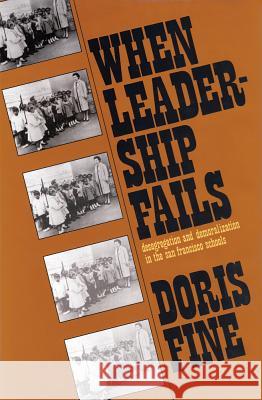When Leadership Fails: Desegregation and Demoralization in the San Francisco Schools » książka
When Leadership Fails: Desegregation and Demoralization in the San Francisco Schools
ISBN-13: 9780887380792 / Angielski / Twarda / 1986 / 332 str.
The belief that desegregation in the public schools has been a failed and costly policy is widespread. Educational standards suffer and public support declines, it is said, when the schools are used as agencies of social reform. In this study of school desegregation in San Francisco, Doris Fine argues that although the schools' difficulties are real, they are due not to the policy of desegregation but to deficiencies of leadership and organization within the schools. Fine's central concern is institutional integrity and the demoralization that sets in when integrity is undermined. Some of the questions she considers are: How did San Francisco's public schools become a central arena for community conflict over issues of civil rights? What options did school leaders have? What happened when the political and educational controversy was brought to federal court? Did court orders help or hinder institutional reform? Most importantly, what adjustments in the leadership and internal dynamics of public schools were necessary for change to be effective? This study of social policy and institutional dynamics documents a painful episode in the history of public schools. It sheds light both on the nature of social change and on the critical role leadership plays in the reform of organizations.











